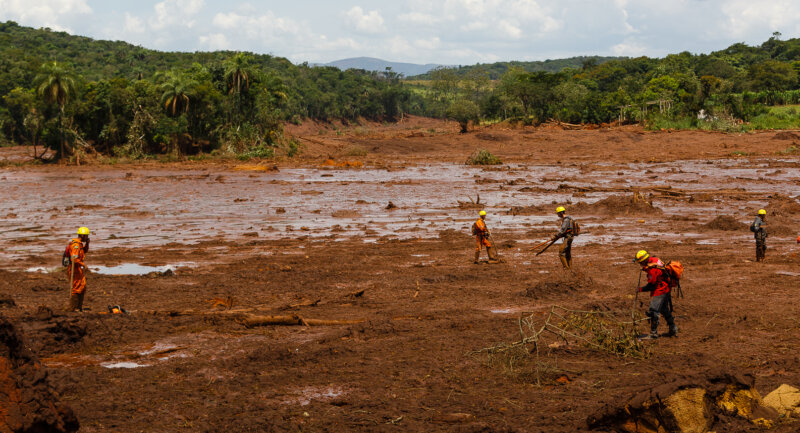President Bolsonaro wants to slash Brazil’s environmental licences, a move critics say will open a free-for-all in the Amazon.
This post was first published by Climate News Network. You can read the original here.
Main image: After the Brumadinho dam burst in 2019: There are fears of a repeat if Brazil’s environmental licensing system is weakened. Photo: Diego Baravelli, via Wikimedia Commons
SÃO PAULO, 19 May, 2021 − The pro-government majority in the lower house of the congress has rushed through a bill (PL3792) which will virtually eliminate the need for Brazil’s environmental licences for a wide range of economic activities, opening the way for widespread exploitation.
The activities which will be freed from licensing include agriculture, cattle raising, logging, dam and road building, sewage plants and water management. Their abolition will impact the Amazon and other biomes, including hundreds of indigenous and quilombo territories, areas occupied by descendants of runaway slaves, which have not yet been officially recognised.
Environmental organisations say the bill’s effects will be disastrous, leading not only to more deforestation, but also to possible repeats of the two mine tailings dam disasters in the state of Minas Gerais, which have killed almost 300 people in recent years.
Under the existing law, any enterprise or activity potentially harmful to the environment must obtain a licence before it can go ahead. IBAMA, the Brazilian Institute of the Environment and Renewable Natural Resources, is responsible for licensing large infrastructure projects. It also consults anthropologists and archaeologists and conducts public hearings in communities that will be affected.
“Environmental licensing is an essential instrument for evaluating, mitigating and compensating environmental impacts. It doesn’t block anything”
Environmental impact studies must be supplied by the project company, including compensation measures where necessary. The new law will replace this complex, often long drawn-out but thorough process with a “self declaration” filed online by the interested party, without any consultation, research or expert opinion. The bill will now go to the Senate, where it is hoped the pressure of public opinion, if sufficiently strong, could lead to it being watered down.
Legislators who supported the bill, many themselves ranchers and landowners, claimed the existing licensing law blocked development, because the process was too slow. But public prosecutor Ana Carolina Haliuc Bragança pointed out that what caused the delays were badly prepared studies of environmental impact, and the environmental agencies that have been hollowed out and left without adequate staff.
“Environmental licensing is an essential instrument for evaluating, mitigating and compensating environmental impacts. It doesn’t block anything”, she said.
For Carlos Bocuhy, president of Proam, the Brazilian Institute for Environmental Protection, the bill “favours private interests in detriment to the public interest, and ignores constitutional guarantees for a balanced environment and the accumulated technical and scientific knowledge on licensing.”
International damage
He said its negative results reached far beyond Brazil’s frontiers, because Brazilian commodities would be associated with environmental deregulation.
Nine former environment ministers from right, left and centrist governments have published an open letter of protest at the bill. They claim it will negatively affect the trade agreement due to be signed between the EU and Mercosur, the bloc of four South American countries (Brazil, Argentina, Uruguay and Paraguay), and will harm Brazil’s hope of joining the OECD as well.
The bill also makes a mockery of US climate envoy John Kerry’s optimistic declaration that Brazil can become a climate leader. Appearing before the foreign relations committee of the House of Representatives, Kerry defended the need to negotiate climate agreements with the government of Jair Bolsonaro, in spite of it having cut 24% from the environment ministry’s budget the day after the climate summit organised by President Joe Biden, saying: “If we don’t talk to them, you can be sure the Amazon forest will disappear.”
Among those already affected by the continuing destruction of the rainforest are Brazilian farmers. A study published in the journal Nature Communications on 10 May found that “the lack of rain and the loss of biodiversity caused by deforestation in the south of the Amazon region is already causing a fall in productivity and income.”
Bolsonaro’s empty promises
The study, by scientists of the Centre for Remote Sensing at the Brazilian universities of Minas Gerais (UFMG) and Viçosa (UFV) and the University of Bonn in Germany, calculated that fewer trees lead to lower humidity in the air and less rainfall. Forest scientist Argemiro Teixeira Leite-Filho, the study coordinator, warned that deforestation is putting Brazil’s agricultural systems on the road to what he called agro-suicide.
And official figures indicate that Amazon deforestation will be higher than ever this year. Satellite images used by INPE, the National Institute for Space Research, have revealed that the equivalent of 58,000 football pitches was illegally cleared in April, a 42% increase on last year, and the highest figure since 2015.
If the licensing bill is ratified unchanged by the Senate, then another hurdle in the path of President Jair Bolsonaro’s plan to turn the Amazon and other Brazilian biomes into free-for-all territories without oversight, enforcement or the rule of law will have been achieved, in flagrant contrast with his promises just a month ago at Joe Biden’s climate summit.
The door will be flung wide open for mining, farming and logging in areas now occupied by conservation units, indigenous and traditional populations. Brazil’s climate promises will have been reduced to a pile of ashes. − Climate News Network

